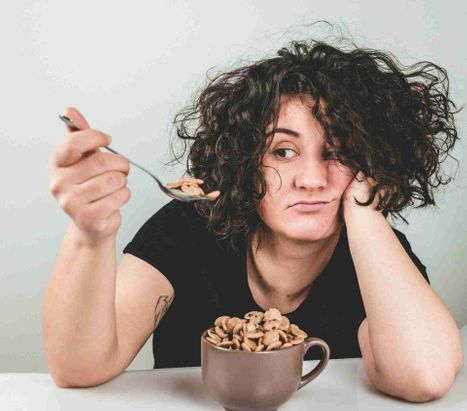Living with food anxiety can be difficult, but there are ways to manage it and recover control of your relationship with food. Here are 7 crucial recommendations to help you get started:
1. Set realistic goals and track your progress. Do not overload yourself with major changes. Set attainable objectives for healthy eating, such as adding one new vegetable to your diet per week. Keep a journal to keep motivated and appreciate your achievements.
2. Embrace a Balanced Diet: Concentrate on providing your body with a range of colorful foods. Consume healthy grains, lean protein sources, fruits, vegetables, and complex carbs to maintain energy and general well-being.
3. Reduce your intake of sugar and processed meals, since they might lead to anxiety and inflammation in the body. Did you know that sugar can be as addictive as cocaine? Research suggests it triggers similar cravings, reward pathways, and even withdrawal symptoms. Reduce your use of sugary beverages, refined carbs, and processed foods. Choose whole meals that are naturally lower in sugar and provide key nutrients.
4. Stay hydrated: Dehydration can exacerbate anxiety symptoms. Drink enough water throughout the day to keep your body hydrated and functioning properly. The average male should consume around 3.7 liters of water, while the average woman should consume around 2.7 liters of water per day.
5. Identify Your Triggers: Recognize the events, emotions, or foods that cause your eating anxiety. Once you've identified these triggers, you may create coping techniques to deal with them successfully.
6. Practice Moderation: Allow yourself occasional delights! Deprivation can trigger cravings and binge eating. Aim for a balanced approach, in which you consume all meals in moderation.
7. Seek Professional treatment: If food anxiety has a substantial influence on your everyday life, do not hesitate to seek professional treatment. Therapists and registered dietitians that specialize in eating disorders can offer direction and support in developing healthy coping mechanisms and a good connection with food.
Managing food anxiety is a process, not a goal. Be patient with yourself, appreciate your accomplishments, and don't be afraid to ask for help. With these suggestions and a supportive attitude, you may overcome food anxiety and cultivate a healthy and joyful relationship with food.


